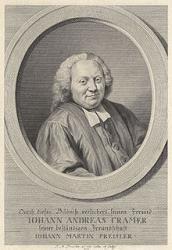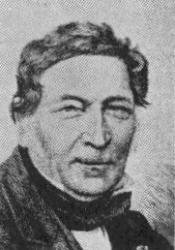1806 - 1878 Person Name: G. Knak Hymnal Number: 61 Author of "Gebet" in Das geistliche Volkslied Knak, Gustav Friedrich Ludwig, son of Christian F. L. Knak, Justiz Commissarius at Berlin, was born at Berlin, July 12, 1806. He matriculated as a student of theology at the University of Berlin, Easter, 1826. In the autumn of 1829 he became tutor in a private school at Königs-Wusterhausen, near Berlin, where he worked manfully for the sick and dying during the cholera year 1831. He returned to Berlin in August, 1832, and acted as one of the editors of the well-known Geistlicher Lieder Schatz (referred to in this Dictionary as the Berlin Geistlicher Lieder Schatz), to which he contributed a number of hymns, and for which he wrote the preface dated Dec. 11, 1832. In the autumn of 1834 he was ordained pastor of Wusterwitz, near Dramburg, in Pomerania; and in the end of 1849 was appointed Gossner's successor as Pastor of the Lutheran-Bohemian congregation (Bethlehemskirche) in Berlin. During a holiday visit to a married daughter at Dünnow, near Stolpemünde, he was taken suddenly ill, and died there July 27, 1878; his body being removed to Berlin and laid to rest in the graveyard belonging to his church (O. Kraus, 1879, p. 266; Allgemeine Deutsche Biographie, xvi. 261, &c).
Knak was a man of prayer, a faithful and successful preacher and pastor, and greatly interested in Missions at home and abroad, especially in the Lutheran missions to China and the Chinese Orphanage at Hong Kong. As a hymn-writer he is distinguished by elegance of style, harmony of rhythm, and deep love to the personal Christ. His hymns appeared in his Simon Johanna, hast du mich lieb? Berlin, 1829 (enlarged editions pub. at Berlin 1840, and again in 1843 as his Zionsharfe); in the Berlin Geistlicher Lieder Schatz, ed. 1832; and in his Liebe urn, Liebe . . . Nachtrag zu dessen Zionsharfe. Werder, 2nd ed. 1849 (3rd ed. Berlin, 1850).
Those of Knak's hymns which have passed into English are:—
i. Lasst mich geh'n, lasst mich geh'n. Longing for Heaven. Of the origin of this favourite hymn, 0. Kraus, 1879, p. 269, gives the following account:—
"Knak's earnest zeal in the cause of missions to the heathen had the natural result, that for many years he was summoned as festival preacher to the most distant Mission services. On the way to fulfil these engage¬ments many of Knak's hymns had their origin. About 1845, one day the pastor of Wusterwitz [his cure] came to pastor Sondermann at Coprieben, and asked him to play the well-known popular melody 'Morgenroth, orgenroth,' as he had just composed a hymn to that tune. As the desired melody rang out, the poet struck up for the first time that hymn since sung by hundreds of thousands, *Lasst mich geh'n! Lasst mich geh'n.” Later, Knak's blind organist, Voigtlander, in Berlin, composed the pleasing melody, to which at the present time the hymn is generally sung."
This hymn appears to have been written on July 23, 1846, and is included in his Liebe um Liebe, 1849 (3rd ed., 1850, No. 48), in 5 stanzas of 5 lines, entitled "Longing after Jerusalem." It soon attained wide popularity, and is given as No. 1597 in the Berlin Geistlicher Lieder Schatz, ed. 1863. Translated as:—
1. To the sky, to the sky. A good and full translation by J. M. Sloan, contributed to J. H. Wilson's Service of Praise, 1865, No. 165, and Songs of Zion, 1878, No. 94; in both cases set to Voigtländer's melody.
2. Let me go, let me go, Jesus, face to face, to know. In full, by Mrs. Edmund Ashley, in the British Herald, Sept., 1867, p. 139; repeated in Reid's Praise Book, 1872. In the Christian Hymns, Adelaide, 1872, No. 347 begins with st. ii. "Glorious light, glorious light."
Other translations are, (1) "Let me close, let me close," as No. 12 in Heart Melodies , Lond., Morgan, N.D., signed “A. P. E. J." (2) "Let me flee, let me flee," by E. Massie, 1866. (3) "Let me go, let me go, Lord to me," by Mrs. H. R. Spaeth, in the Southern Lutheran Service & Hymns for Sunday Schools , Philadelphia, 1883. (4) "Let me go! ah, let me go," by J. Kelly, 1885.
Other hymns by Knak which have been translated into English are:—
ii. Herr, du hast uns reich gesegnet. Close of Divine Service. Zionsharfe, 1843, No. 92, in 2 st. Tr. as "Lord, we've tasted Thy rich blessing," in L. Rehfuess's Church at Sea, 1868.
iii. Ich bin ein Pilger Gottes hier auf Erden. Pilgrimage of Life. Liebe um Liebe, 3rd ed. 1850, No. 45, in 4 stanzas. Translated as "God's pilgrim am I here, on earth below," by J. Kelly, 1885.
iv. Jesus sei mit dir auf alien Wegen. Birthday wish. Liebe um Liebe, 3rd ed. 1850, No. 36, in 22 lines. Tr. as (1) "Jesus be with thee in thy ways, Jesus favour," in L. Rehfuess's Church at Sea, 1868. (2) “Jesu be with thee in all thy ways, Jesu crown," by J. Kelly, 1885.
v. Mit der Sehnsucht heissen Blicken. Love to Christ. Zionsharfe, 1840, p. 4, in 6 stanzas. Translated as "With the glow of ardent longing," by Miss Burlingham, in the British Herald, Sept. 1865, p. 141.
vi. Sei getrost, o Seele. Cross and Consolation. Zionsharfe, 1840, p. 2, in 3 stanzas. Translated as "O my soul, be comforted, Give not," by J. Kelly, 1885.
vii. Wenn Seelen sich zusammenflnden. Communion of Saints. Berlin Geistlicher Lieder Schatz, ed. 1832, No. 1857, in 5 stanzas. Tr. as "When they may chance to meet together," by Dr. H. Mills, 1845 (1856, p. 186).
viii. Zieht im Frieden eure Pfade. Farewell. Zionsharfe, 1843, No. 86, in 11 lines. Tr. as "Now in peace go on your ways," in L. Rehfuess's Church at Sea, 1868. [Rev. James Mearns, M.A.]
--John Julian, Dictionary of Hymnology (1907)
Gustav Friedrich Ludwig Knak


 My Starred Hymns
My Starred Hymns




